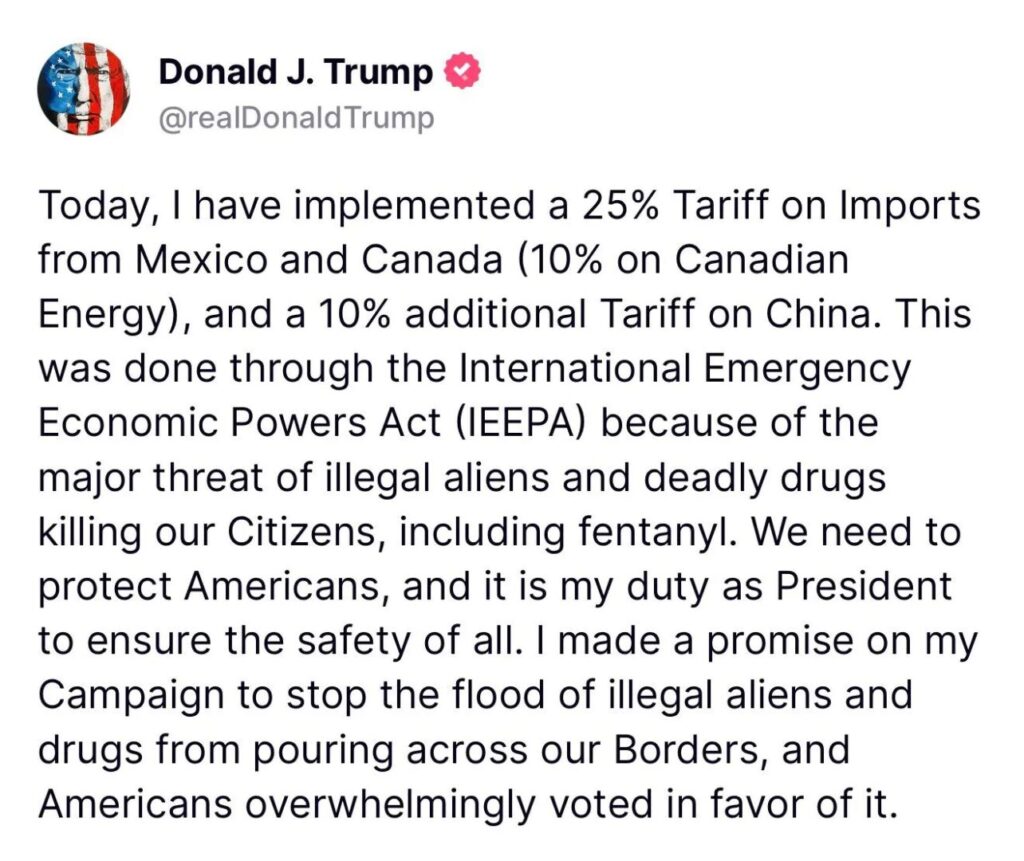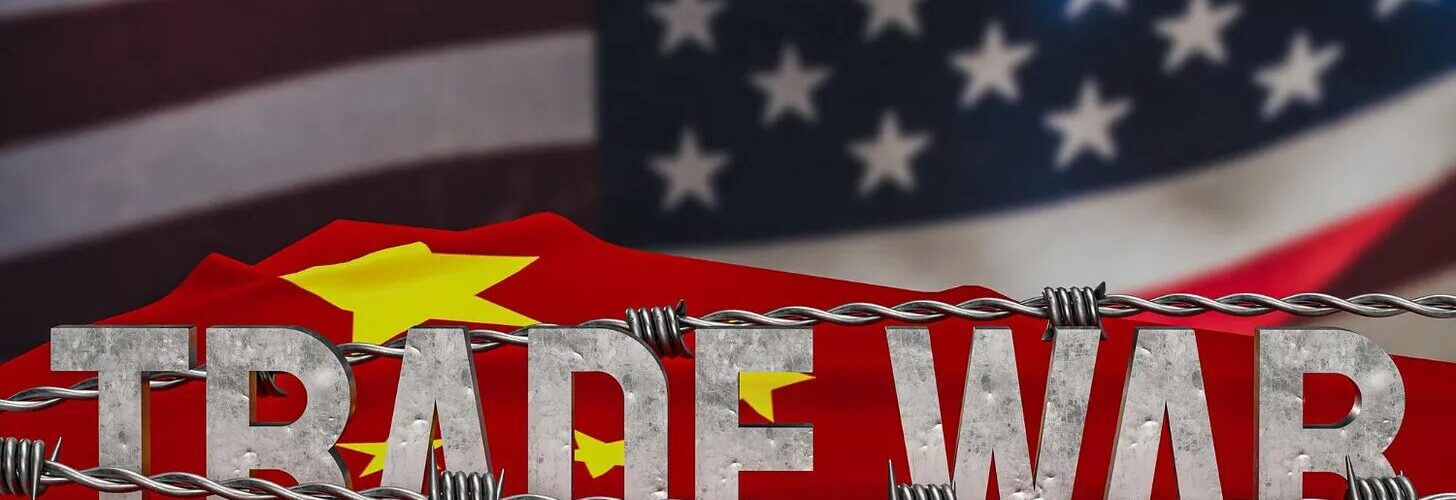After many threats and warnings on the campaign trail to levy tariffs on a number of different countries, President Trump today announced the first wave of tariffs against China, Mexico and Canada, with most of the emphasis placed on Mexico, blamed for the immigration and drug crisis in the United States. Mexico immediately responded with its own tariffs against the U.S.
Investopedia defines a tariff as “a tax imposed by one country on the goods and services imported from another country to influence it, raise revenues, or protect competitive advantages.” It also lists some criticisms of implementing tariffs:
- They can make domestic industries less efficient and innovative by reducing competition.
- They can hurt domestic consumers since a lack of competition tends to push up prices.
- They can generate tensions by favoring specific industries or geographic regions over others. For example, tariffs designed to help manufacturers in cities may hurt consumers in rural areas who do not benefit from the policy and are likely to pay more for manufactured goods.
- Finally, an attempt to pressure a rival country by using tariffs can devolve into an unproductive cycle of retaliation, commonly known as a trade war.
In other words, the importer (U.S. companies in this case) pay the additional fees.
Via executive order, “Trump is implementing a 25% additional tariff on imports from Canada and Mexico and a 10% additional tariff on imports from China. Energy resources from Canada will have a lower 10% tariff.”

The Trump White House provided its reasons for the tariffs:
The extraordinary threat posed by illegal aliens and drugs, including deadly fentanyl, constitutes a national emergency under the International Emergency Economic Powers Act (IEEPA).
President Trump is taking bold action to hold Mexico, Canada, and China accountable to their promises of halting illegal immigration and stopping poisonous fentanyl and other drugs from flowing into our country.
The orders make clear that the flow of contraband drugs like fentanyl to the United States, through illicit distribution networks, has created a national emergency, including a public health crisis. Chinese officials have failed to take the actions necessary to stem the flow of precursor chemicals to known criminal cartels and shut down money laundering by transnational criminal organizations.
In addition, the Mexican drug trafficking organizations have an intolerable alliance with the government of Mexico. […]
Access to the American market is a privilege. The United States has one of the most open economies in the world, and the lowest average tariff rates in the world.
While trade accounts for 67% of Canada’s GDP, 73% of Mexico’s GDP, and 37% of China’s GDP, it accounts for only 24% of U.S. GDP. However, in 2023 the U.S. trade deficit in goods was the world’s largest at over $1 trillion.
President Trump promised in November to “sign all necessary documents to charge Mexico and Canada a 25% Tariff on ALL products coming into the United States, and its ridiculous Open Borders. This Tariff will remain in effect until such time as Drugs, in particular Fentanyl, and all Illegal Aliens stop this Invasion of our Country!”
On the campaign trail, Trump emphasized his love for tariffs, as noted by The WinePress. “I can’t believe how many people are negative on tariffs that are actually smart,” Trump says. “Man, is it good for negotiation. I’ve had guys, I’ve had countries that were potentially extremely hostile coming to me and saying, ‘Sir, please stop with the tariff stuff.’”
Trump even hinted at hefty tariffs of 60% to 100% levied against China. He also has toyed with the idea of a 100% tariff on Mexican goods.
World Affairs in Context reported Trump has also threatened 100% tariffs on BRICS+ members.
Read the rest of the report for free on Substack:

[7] Who goeth a warfare any time at his own charges? who planteth a vineyard, and eateth not of the fruit thereof? or who feedeth a flock, and eateth not of the milk of the flock? [8] Say I these things as a man? or saith not the law the same also? [9] For it is written in the law of Moses, Thou shalt not muzzle the mouth of the ox that treadeth out the corn. Doth God take care for oxen? [10] Or saith he it altogether for our sakes? For our sakes, no doubt, this is written: that he that ploweth should plow in hope; and that he that thresheth in hope should be partaker of his hope. (1 Corinthians 9:7-10).
The WinePress needs your support! If God has laid it on your heart to want to contribute, please prayerfully consider donating to this ministry. If you cannot gift a monetary donation, then please donate your fervent prayers to keep this ministry going! Thank you and may God bless you.








Jacob can you please write an article about this video, pleeeeeease? It’s about Canada , please don’t forget about your brothers and sister in Christ in Canada.
I get paid over 220 Dollars per hour working from home with 2 kids at home. i never thought i’d be able to do it but my best friend earns over 15k a month doing this and she convinced me to try. it was all true and has totally changed my life. This is what I do, check it out by Visiting Following Website
.
COPY HERE → HighProfit1.com@
PLEASE DONT COPY @
What should we do with our birth certificates and S.I.N.? For those that have them without being informed of this corporate fraud indentities?
I asked someone in public what he thinks of the tariffs. He’s fuming over it and said he’s just sticking to buying Canadian-made products, online or whatever other ways.
heres more evidence if you need to write an article https://www.youtube.com/watch?v=QvN40Btkofs
Aaaand, both Mexico and Canada have caved. Both countries sending troops to their borders. Trump appears to know what he is doing.
Oh, except that Mexico and Canada had already committed to doing that long before the tariff. https://croakycaiman.substack.com/p/the-great-tariff-theater-a-production
You actually make it appear so easy along with your presentation however I in finding this topic to be really one thing that I think I’d never understand. It seems too complicated and very huge for me. I am having a look ahead to your subsequent post, I will attempt to get the hang of it!
I’m so happy to read this. This is the kind of manual that needs to be given and not the accidental misinformation that’s at the other blogs. Appreciate your sharing this best doc.
Some truly excellent info , Glad I observed this. “A poem is never finished, only abandoned.” by Paul Valery.
I loved up to you’ll obtain performed right here. The cartoon is attractive, your authored subject matter stylish. nonetheless, you command get got an nervousness over that you would like be turning in the following. ill no doubt come further in the past once more since exactly the similar nearly very often within case you defend this increase.
Thank you for every other informative web site. Where else may I am getting that type of information written in such a perfect method? I have a undertaking that I am simply now running on, and I’ve been at the glance out for such information.
I do not even know how I ended up here, but I thought this post was great. I don’t know who you are but certainly you are going to a famous blogger if you aren’t already 😉 Cheers!